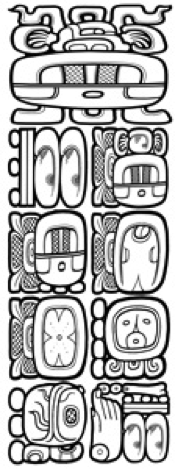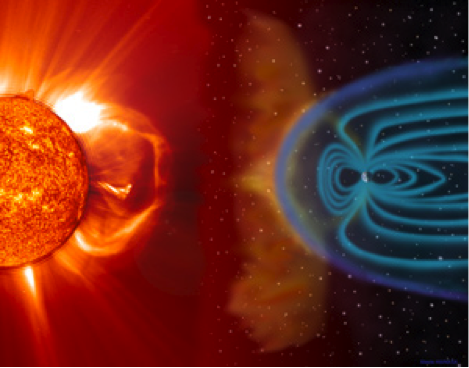2012 Talking Points
Presented here are some essential points regarding the 2012 Doomsday Phenomenon. Within these main points are links to sources of evidence for a particular topic.
The Maya did not predict the end of the world in 2012

A drawing of the 13th Bak’tun Long Count date as it might have been depicted by an ancient Maya scribe. Image Credit: Mark Van Stone.
Modern science reveals no evidence for natural global cataclysms in 2012.
- Meteors do impact the Earth. Major impacts have occurred in the past, and will occur in the future. However, there are no known meteor hazards for the immediate future.
http://neo.jpl.nasa.gov/risk/index.html
- The Sun’s cycle of magnetic activity (the sunspot cycle) is expected to peak in 2013 (not 2012). Most big solar storms typically happen after the peak. This cycle is predicted to be the weakest in a hundred years, however. So while solar storms and space weather affect our space-age technology, we can expect a calmer upcoming solar maximum than recently past ones. The Sun has been producing these storms for billions of years and Earth has survived them all.
http://solarscience.msfc.nasa.gov/predict.shtml

An illustration (not drawn to scale) of a coronal mass ejection being launched from the Sun toward Earth (which is enveloped by its protective magnetic field). Image Credit: Steele Hill/NASA
- Gamma Ray Bursts are the violent deaths of massive stars or the collisions of neutron stars. They happen about once per day somewhere in the Universe. To be dangerous to Earth one has to happen in our Galaxy and the beam of gamma rays in such an event needs to be pointed directly at us. The odds of such an event occurring in any given year are very low: about 1 in 270 million.
http://swift.sonoma.edu/about_swift/grbs.html
http://www.pbs.org/wgbh/nova/gamma/milkyway.html
- The planets of our Solar System will not all align in 2012, nor have they recently or will they in the near future. But if such an alignment were to occur, the gravitational effects would be utterly insignificant.
http://www.badastronomy.com/bad/misc/planets.html
1152